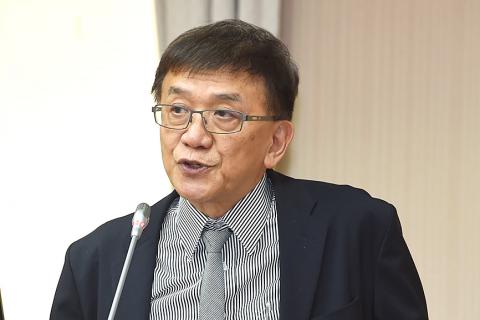The Taiwan Transportation Safety Board should be more actively involved in the investigation of accidents related to military aircraft after a second Black Hawk helicopter crash in January, a lawmaker said yesterday at a meeting of the legislature’s Transportation Committee.
The Jan. 2 UH-60 Black Hawk helicopter crash killed eight military personnel on board, including then-chief of the general staff General Shen Yi-ming (沈一鳴).
In its investigation report released on Feb. 14, the Ministry of National Defense attributed the accident to the weather, terrain and human factors.

Photo: Liu Hsin-de, Taipei Times
Democratic Progressive Party (DPP) Legislator Lin Chun-hsien (林俊憲) questioned the validity of the report, as the investigation was conducted by the air force itself.
Modern technology has enabled pilots to set a safe operational altitude and flight route, as well as obtain instant weather information in flight, Lin said, adding that the weather radar would have informed the pilots where thick clouds had formed along the route.
“If flying through the clouds would cause a helicopter to crash, then the air force might as well only allow them to fly if it is sunny,” Lin said.
The board should do more than just decoding information from flight data and cockpit voice recorders, also known as “black boxes,” he said.
“People across the nation were pained to hear that high-ranking military officials died in the helicopter crash. How can anyone expect the truth behind the crash to surface if the air force was also responsible for conducting the investigation? It was the same reason that we did not let the Taiwan Railways Administration [TRA] investigate the Puyuma Express derailment in 2018,” he said.
Lin said he also disagreed with the ministry’s solution to the problem, which is to have experienced air force pilots and pilot trainers operate the helicopter if it is carrying top military officials.
The board was established in August last year to have an independent third-party investigate the causes of major transportation accidents in a fair, just and open manner, he said, adding that the board should speak up.
Some of the board’s members should be pilots as well, he said.
In response, board Chairman Young Hong-tsu (楊宏智) said that the air force had formed a committee to investigate the helicopter crash, but it did not ask board officials to attend the committee meetings.
The board, previously known as the Aviation Safety Council, signed a memorandum of understanding with the ministry 10 years ago, allowing the board to assist the ministry when there is an accident involving military aircraft.
Young said the data collected in the past two decades showed that 80 percent of aviation accidents were caused by human errors.
However, the board is only authorized to investigate accidents involving civil aircraft, he said.
Young also dismissed a report that the ministry is investigating if the board had leaked crucial information to the news media.
The source of the false report was an academic institution, which meant to sway public opinion through the messages it posted on Facebook, he said.

A small number of Taiwanese this year lost their citizenship rights after traveling in China and obtaining a one-time Chinese passport to cross the border into Russia, a source said today. The people signed up through Chinese travel agencies for tours of neighboring Russia with companies claiming they could obtain Russian visas and fast-track border clearance, the source said on condition of anonymity. The travelers were actually issued one-time-use Chinese passports, they said. Taiwanese are prohibited from holding a Chinese passport or household registration. If found to have a Chinese ID, they may lose their resident status under Article 9-1

Taiwanese were praised for their composure after a video filmed by Taiwanese tourists capturing the moment a magnitude 7.5 earthquake struck Japan’s Aomori Prefecture went viral on social media. The video shows a hotel room shaking violently amid Monday’s quake, with objects falling to the ground. Two Taiwanese began filming with their mobile phones, while two others held the sides of a TV to prevent it from falling. When the shaking stopped, the pair calmly took down the TV and laid it flat on a tatami mat, the video shows. The video also captured the group talking about the safety of their companions bathing

PROBLEMATIC APP: Citing more than 1,000 fraud cases, the government is taking the app down for a year, but opposition voices are calling it censorship Chinese Nationalist Party (KMT) Chairwoman Cheng Li-wun (鄭麗文) yesterday decried a government plan to suspend access to Chinese social media platform Xiaohongshu (小紅書) for one year as censorship, while the Presidential Office backed the plan. The Ministry of the Interior on Thursday cited security risks and accusations that the Instagram-like app, known as Rednote in English, had figured in more than 1,700 fraud cases since last year. The company, which has about 3 million users in Taiwan, has not yet responded to requests for comment. “Many people online are already asking ‘How to climb over the firewall to access Xiaohongshu,’” Cheng posted on

A classified Pentagon-produced, multiyear assessment — the Overmatch brief — highlighted unreported Chinese capabilities to destroy US military assets and identified US supply chain choke points, painting a disturbing picture of waning US military might, a New York Times editorial published on Monday said. US Secretary of Defense Pete Hegseth’s comments in November last year that “we lose every time” in Pentagon-conducted war games pitting the US against China further highlighted the uncertainty about the US’ capability to intervene in the event of a Chinese invasion of Taiwan. “It shows the Pentagon’s overreliance on expensive, vulnerable weapons as adversaries field cheap, technologically